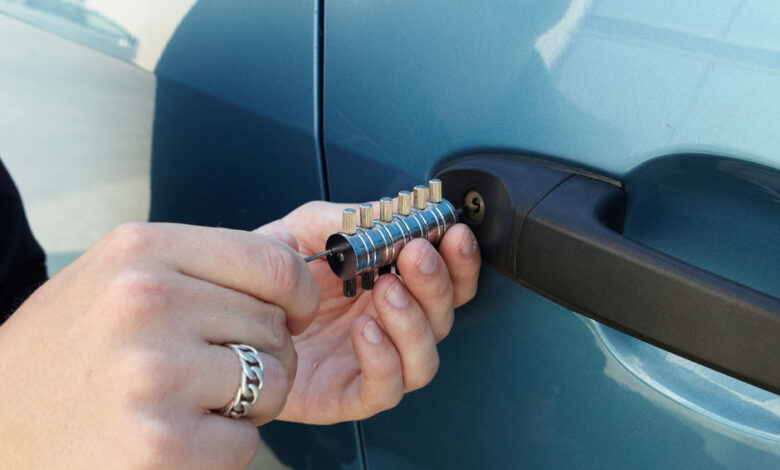How Much is an Automotive Locksmith

Locksmithing is an ancient trade that dates back thousands of years. While in the past locksmiths mainly worked with physical locks and keys, today’s locksmiths specialize in a wide range of security services. One important type of modern locksmith is the automotive locksmith.
Automotive locksmiths focus on keys, locks, and security systems specifically for motor vehicles. Their primary role is to help drivers who have locked their keys in a car, lost their car keys, or need to replace or repair their car’s ignition or locks. They have the skills to make replacement keys, extract broken keys, and bypass locks to gain entry into vehicles. Automotive locksmiths also install, repair, and rekey locks, as well as make transponder keys and program key fobs for many makes and models of vehicles. They are mobile and can provide roadside assistance for lockouts and other issues. Their specialized knowledge of automotive locks and security systems makes them an important resource for drivers.
Duties and Responsibilities
An automotive locksmith has a wide range of duties and responsibilities related to working with locks, keys, and security systems for cars, trucks, and other vehicles. Some of the most common duties include:
-
Installing, repairing, replacing, and rekeying locks – This involves installing new locks, fixing broken or malfunctioning locks, swapping out old locks for new ones, and reconfiguring lock cylinders so a new key will work.
-
Making duplicate keys – Automotive locksmiths can duplicate keys for vehicles based on an existing key or by decoding the key’s pattern. This allows them to provide replacement keys to owners who have lost theirs.
-
Extracting broken keys – When part of a key breaks off and gets stuck in the ignition or door lock, locksmiths have specialized tools to remove it. This prevents further damage to the lock cylinder.
-
Programming transponder keys – Modern keys contain transponder chips that must be electronically programmed to match the vehicle. Locksmiths have equipment to code and program new transponder keys.
-
Unlocking cars – Whether owners have locked their keys inside or lost their keys, locksmiths have techniques to gain entry into locked vehicles without causing damage.
-
Opening locked trunks – For keys that only open doors and not the trunk, locksmiths can create new keys or pick/manipulate the lock to gain trunk access.
Automotive locksmiths handle all kinds of issues related to vehicle locks and keys. Their primary duty is ensuring drivers can securely access and operate their vehicles using the proper keys and locks. This requires specialized skills with cutting, programming, decoding, and manipulating automotive lock systems.
Training and Education
Most automotive locksmiths complete an apprenticeship program to gain the necessary skills and experience for the job. Apprenticeship programs typically last 3-4 years and provide a combination of on-the-job training and classroom education. Apprentices learn skills like key duplication, lock picking, lock installation, and programming electronic locks and keys.
In addition to apprenticeships, there are locksmith training schools that offer certificate programs ranging from a few weeks to a couple years. These programs provide concentrated education in areas like master key systems, safe opening, and automotive lock service. Hands-on training is emphasized.
Certification is also available through professional associations like the Associated Locksmiths of America (ALOA). Certification demonstrates competency and can give locksmiths a competitive edge.
Licensing requirements for locksmiths vary by state. Some states require locksmiths to pass an exam and complete continuing education. Licenses ensure locksmiths are properly trained and understand local regulations.
Overall, a combination of apprenticeship training, vocational school, certification, and licensing provides automotive locksmiths with the comprehensive skills and knowledge needed for the profession. On-the-job experience under the guidance of veteran locksmiths is especially valuable.
Important Skills
An automotive locksmith needs to possess and master several important skills to be successful in this career. Some of the most crucial skills include:
Dexterity
Automotive locksmiths need excellent dexterity and hand-eye coordination in order to precisely manipulate lock mechanisms and small parts. They frequently work in tight, cramped spaces inside dashboards and doors, requiring the ability to use tools and parts with precision.
Problem-Solving
Automotive locksmiths must have sharp critical thinking and analytical abilities to diagnose issues and come up with solutions. Whether figuring out how to extract a broken key or decode an unfamiliar electronic lock, they rely on ingenuity and problem-solving on a daily basis.
Customer Service
Strong customer service skills allow automotive locksmiths to interact with clients in a professional and courteous manner. They need to be able to explain procedures, provide estimates, and resolve any concerns that arise. Their work quality and timeliness also impacts customer satisfaction.
Time Management
Automotive locksmiths must effectively budget their time when balancing multiple clients and jobs. They need to be able to prioritize urgent matters while also sticking to schedules and appointment times. Good time management helps maximize productivity and profitability.
Attention to Detail
Working with intricate lock mechanisms requires meticulous attention to detail. Automotive locksmiths cannot afford to be careless, as small mistakes can easily lead to bigger problems down the line. Keen observation skills and focus are crucial when handling tiny parts and following precise procedures.
Tools of the Trade
An automotive locksmith relies on specialized tools and equipment to successfully complete their work. Some of the most common tools used include:
-
Pick tools – These thin, curved pieces of metal are inserted into the keyway and manipulated to lift, push, and align the pins inside to unlock the mechanism without a key. There are many types of pick tools for different locks.
-
Tension wrenches – Used in conjunction with pick tools, these apply torque to the lock cylinder to hold the pins in place once lifted by the pick. Different sizes and shapes are needed for various locks.
-
Key cutters – These machines cut new or duplicate keys by tracing an existing key’s cuts. Advanced electronic key cutters can produce transponder keys.
-
Transponder key programmers – Used to program the electronic chip inside modern transponder keys. This allows the key to communicate with the vehicle’s immobilizer system.
-
Lockout kits – Contain tools like long reach tools, door wedges, and air wedges to assist in unlocking a vehicle without damaging it.
-
Code grabbers – Decode the electronic signal from a transponder key to identify the correct key cut and code for programming new keys. This allows keys to be made without an existing physical key.
Having the proper tools for each job is critical for automotive locksmiths. They invest in high-quality equipment and continuously upgrade as newer vehicle technologies emerge. Their specialized tools allow them to efficiently handle a wide range of lockout, key duplication, and rekeying jobs.
Average Salary
The average salary for an automotive locksmith in the United States is around $45,000 per year. However, salaries can vary significantly depending on factors such as location, experience, and type of employer.
Some key factors that influence an automotive locksmith’s earnings include:
-
Location – Automotive locksmith salaries tend to be higher in major metropolitan areas compared to rural regions. Large cities like New York and Los Angeles typically offer higher pay.
-
Experience – More seasoned locksmiths who have been working in the field for many years generally earn more than entry-level locksmiths. Those with 10+ years of experience can make over $60,000 annually.
-
Type of employer – Automotive locksmiths working for large dealerships, auto shops, or security companies tend to have higher salaries than independent locksmiths. Those who run their own small business may have more fluctuation in earnings.
-
Certification – Locksmiths who obtain professional certification through an organization like the Associated Locksmiths of America (ALOA) can boost their salary potential. Certification demonstrates specialized expertise.
-
Overtime – Locksmiths who take on extra evening, weekend, and on-call hours doing emergency or mobile work can significantly increase their annual pay through overtime wages.
The top 10% of earners in this field make $70,000 or more per year. However, a beginner automotive locksmith starting out may only earn $25,000-35,000 during their first year in the role. Overall earnings potential tends to increase with time, experience, and reputation.
Job Outlook and Growth
The job outlook for automotive locksmiths is strong. According to the U.S. Bureau of Labor Statistics, employment of locksmiths is projected to grow 7 percent from 2020 to 2030, faster than the average for all occupations. Several factors are contributing to this positive outlook:
-
Increased demand for more sophisticated and complex vehicle security systems. As vehicles continue to incorporate more technology, there is greater need for locksmiths who can work on electronic and computerized locks and keys. This requires specialized technical skills and training.
-
Growth in the overall number of vehicles on the road. More vehicles equals greater demand for locksmith services related to making replacement keys and unlocking doors.
-
Expanding services. Locksmiths today provide more services beyond traditional key cutting and lock repair. Offering mobile services, programming transponder keys, making high-security keys, and installing and repairing ignition interlock devices provide more business opportunities.
-
Insurance company partnerships. Many locksmiths receive referrals from auto insurance companies to assist motorists who have locked their keys in a vehicle or need replacement keys. These partnerships provide a steady stream of customers.
The future looks bright for those entering this career field. There will be ample job openings to accommodate growth as current locksmiths retire from the workforce. Those who pursue the necessary training and develop expertise in electronic and computerized lock systems will be well-positioned for success. The increased use of technology in automobiles ensures demand for qualified locksmiths will remain strong.
Pros and Cons
Pros
-
Flexibility – Automotive locksmiths often set their own schedules and have flexibility in when and where they work. This appeals to people who like having control over their time.
-
Helping people – There’s satisfaction in being able to quickly get someone back into their locked car or home. Automotive locksmiths provide a valuable service that helps put people at ease.
-
Problem-solving – Each lockout situation presents an interesting puzzle to solve. Automotive locksmiths need to assess the situation and determine the best approach to regain entry. This work appeals to people who enjoy a mental challenge.
-
Variety – No two jobs are ever the same, and locksmiths enjoy the diversity of different makes/models of vehicles and types of lockout situations they encounter. This keeps the work exciting day-to-day.
Cons
-
Physical demands – The work often requires standing for long periods, working in awkward positions, lifting heavy equipment, and making repetitive motions. This can lead to fatigue and injury over time.
-
Being on call – Automotive locksmiths may need to be available 24/7 in case of emergency calls. This can disrupt work-life balance.
-
Working outdoors – Locksmiths work outdoors in all weather conditions, including extreme heat, cold, rain, and snow. This exposure can be uncomfortable.
-
Solo work – Many automotive locksmiths work independently with little interaction with others. People who prefer teamwork may find this solitary work a drawback.
-
Stress – Dealing with frustrated, desperate customers in tense situations can be stressful. High pressure coupled with the need for precision can take a toll.
Notable Organizations
The automotive locksmith industry has several notable organizations that provide support, advocacy, and professional development opportunities.
The Associated Locksmiths of America (ALOA)
ALOA is the largest locksmith trade association in the world, with over 3,500 members. They provide training courses, industry resources, and an annual convention and trade show. Membership provides access to insurance, marketing resources, and a job board.
The Society of Professional Locksmiths (SPL)
SPL provides locksmith training programs and professional certifications. They offer different membership levels that provide access to training discounts, legal services, and other benefits. SPL aims to promote ethical business practices within the industry.
The National Locksmith Guild
This non-profit guild focuses on continuing education and professional development. They provide training programs, conferences, and resources. Members gain access to group insurance plans, marketing services, and other member benefits. The guild offers professional certifications.
State Locksmith Associations
Many states have local locksmith associations that provide networking, training, and advocacy on a regional level. These groups help locksmiths connect and share knowledge within their geographic area. They also lobby for locksmith-friendly regulations at the state level.
Conclusion
An automotive locksmith is an interesting and varied career path for someone who enjoys working with their hands, solving puzzles, and helping people. The job requires specialized technical training, manual dexterity, problem-solving skills, and knowledge of automotive systems. While the work can be physically demanding at times, automotive locksmiths take pride in their ability to quickly and efficiently unlock vehicles and make replacement keys. They provide an important service to drivers who find themselves locked out of their cars or homes.
The career outlook for automotive locksmiths is strong, as demand is projected to grow over the next decade. Those interested in the field should be prepared to invest in the proper training and tools of the trade. Hands-on apprenticeships are the best way to gain practical experience. With some states requiring licensure, it’s important to understand the local regulations. While the job involves some routine tasks, no two jobs are ever exactly the same, which keeps things interesting. For those who enjoy tinkering with locks and keys, automotive locksmithing can be a rewarding long-term career choice.





